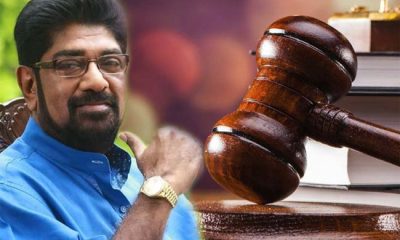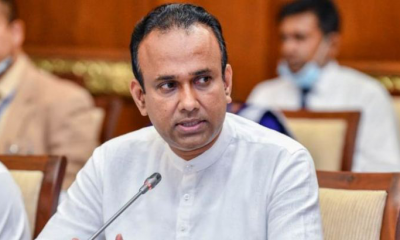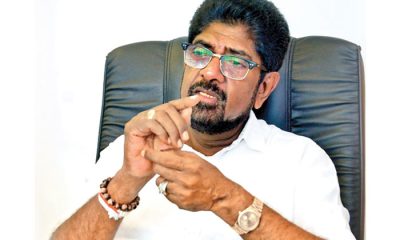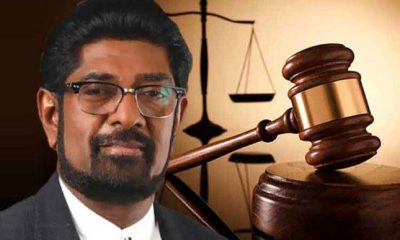Editorial
Keheliya’s exit and the upcoming budget

Last week’s removal of Health Minister Keheliya Rambukwella from his position was not altogether unexpected. True, he had predictably weathered a motion of no confidence in parliament last month after a three-day debate, thanks to the pohottuwa’s voting strength. Although he had the confidence of 113 members of the SLPP and a 40-vote majority, he obviously did not have the confidence of President Ranil Wickremesinghe who replaced him at the health ministry with Dr. Ramesh Pathirana, a qualified though non-practicing doctor. Whether Pathirana gladly accepted the assignment thrust upon him or not, the public will not know. But he seems to have successfully insisted that he remains Minister of Industries, part of his old portfolio, although he has divested himself of plantation industries for which he was previously responsible.
The Ministry of Health and the minister personally had been under sustained attack in the media and on the streets for a variety of reasons for the past several months. Among these was the alleged irresponsible import of substandard medicine and surgical equipment which had weakened the health sector and caused the death of several patients under treatment at state hospitals.
The main opposition alleged that the government continued to bring in low quality medicines and surgical equipment without complying with due procurement and registration processes on the excuse that compulsions of emergency purchases for urgent needs required lowering barriers. Rambukwella’s problems began way back in 2022 when a lot of noise was made about a visit he made to India to inspect a pharmaceutical factory from which Colombo intended to import medicines.
On that occasion, it was alleged that an Indian pharmaceutical company had funded the minister’s visit. He strongly denied these allegations saying a friend paid the expenses as his credit card had reached its weekly spending limit. He had since reimbursed the friend in cash upon landing in India. He told a Colombo news conference at his ministry that he had traveled to 86 countries, the first being to England with his parents an eight-year old, and was now holding his 17th passport.
He claimed he maintained close relations with travel companies as he was a frequent traveller and there were two of three companies that offered him massive discounts. As a cabinet minister, he could have used government funds for the trip but did not do so as the government had advised ministers to be economical in their spending. He also displayed a receipt at the press conference indicating that the payment for his ticket had been made by his friend and not a pharmaceutical company.
Rambukwella countered questions on his expertise on pharmaceuticals and their manufacture saying he took the chief executive officer of the National Medicines Regulatory Authority on this visit for this reason. He was quoted saying that when the country was spending 250 million dollars for purchases of medicine, did he not as health minister have the right to look into these industries, using his own funds? Whether the public, given its wide perceptions of politicians in general, would buy into the argument that they would spend out of pocket on public business, is another question. It will not be difficult to provide a near unanimous answer to that.
However that be, a legitimate question that can be posed to the president is that if Keheliya Rambukwella has proved himself a massive failure, as all the circumstantial evidence surrounding his departure from the health ministry suggests, then how good a job will he do at the environment ministry in which he has been found a comfort zone? The harsh reality is that the president, who to his credit has resisted massive pressure from the SLPP to expand the cabinet, is not strong enough to make a sacrificial lamb of the former health minister and has found him an alternative ministry without banishing him to the back bench.. Rambukwella, swallowing his pride – if he has any – has accepted. But is the overburdened taxpayer, already reeling under the weight of an unbearable cost of living, have any choice but pick up the tab.
President Wickremesinghe a few days ago told the UNP Convention that the presidential election followed by the parliamentary poll will be held the next year and the year after as decreed in the constitution. But the recent appointment of a Presidential Commission to report on prevailing election law and desirable changes have created fears that powers that be may be having some politricks up their sleeve to quote Mr. Neal de Alwis, a well known leftist of yesteryear. There is no doubt that the president has brought a semblance of stability to the country after last year’s chaos. But whether that can be sustained once Sri Lanka resumes paying its debts is an open question.
The Rajapaksas and their fellow travellers are now out of the woodwork. The president took a couple of them to the UN general assembly in September despite ours being a bankrupt nation. Namal Rajapaksa and SLPP General Secretary Sagara Kariyawasam last week, in effect, took the president to task over the recent cabinet changes. This provoked Nimal Lanza, a pro-Ranil SLPPer to loudly proclaim that Namal and Sagara are free to defeat next month’s budget, if they dare, and force a parliamentary election.
We no doubt live in interesting times. Whatever next month’s budget brings, it will not be sunshine. More hardships are inevitable and concessions to meet mounting demands without money printing will be impossible. The president as finance minister and the government locked into an agreement with the IMF will have to walk an impossible tightrope. Whatever happens, hopefully the next few months will see the election which is the rightful due of the people.
Editorial
Ensure safety of COPF Chairman

Saturday 8th June, 2024
It was with shock and dismay that we received the news about death threats to COPF (Committee on Public Finance) Chairman Dr. Harsha de Silva over the ongoing parliamentary probe into the on-arrival visa scam. Dr. de Silva yesterday told Speaker Mahinda Yapa Abeywardena, in Parliament, that he was facing death threats and intimidation, and it was incumbent upon Parliament to ensure his safety. He stopped short of naming names, but revealed that some ruling party MPs were among those who had ganged up against him. The Speaker only said there had been no complaint, and he would look into the matter.
The SLPP-UNP government has been doing everything in its power to have all parliamentary committees under its thumb. The COPE (Committee on Public Enterprises), which once helped restore public faith in the legislature by exposing state sector corruption, has now become a mere appendage of the incumbent regime, thanks to the appointment of SLPP MP Rohitha Abeygunawardena as its Chairman. The SLPP-UNP combine also tried to oust COPF Chairman Dr. de Silva, but in vain. However, it knows more than one way to shoe a horse.
The COPF, under Dr. de Silva’s chairmanship, has been a thorn in the side of the government, which is struggling to cover up numerous corrupt deals. Dr. de Silva yesterday told Parliament that he found it extremely difficult to function as the COPF head due to severe resource constraints his committee was facing; he himself had to pay the salaries of some of his staff members besides burning the midnight oil.
The sheer workload he had to cope with as the COPF chief had taken its toll on his health, he said, informing the Speaker that he was at the end of his tether, and at times thought of resigning from the COPF. This is exactly what the government wants him to do; resource squeezes and threats are aimed at making him quit.
On 26 May, Dr. de Silva revealed, in an ‘X’ post, that the COPF had uncovered some vital information about the visa scam and it would reveal everything after its final meeting on the issue; the COPF was committed to exposing the truth behind the controversial tender, he added. In an editorial comment on 27 May, we warned him.
While thanking him for his bold stand, we pointed out that by making such a statement, he had thrown caution to the wind, and become a marked target, with the government making an all-out effort to delay the COPF investigation lest the truth should come out much to the detriment of its interests in this election year. Unfortunately, what was feared has come about; Dr. de Silva is complaining of death threats and government moves to strangulate the COPF financially to derail its investigations.
Dr. de Silva’s predicament exemplifies the fate that befalls the few good men and women in Parliament. It is hoped that all those who seek an end to the state sector corruption will rally behind Dr. de Silva, and bring pressure to bear on the government to ensure his safety. Let Dr. de Silva be urged to reveal the names of those who have issued threats, veiled or otherwise, to him and are trying to scuttle the COPF probes.
Editorial
Dead man walking!

Friday 7th June, 2024
The SLPP-UNP government is going hell for leather to make bad laws as if there were no tomorrow. It is abusing its parliamentary majority, which has been retained with the help of some crossovers, for that purpose. The Opposition, the media and trade unions are up in arms, and understandably so. The incumbent regime is a dead man walking; it is so desperate that it is capable of anything. Hence the need for it to be restrained.
The Electricity (Amendment) Bill (EAB) plunged Parliament into turmoil yesterday, but the government secured its passage. The Supreme Court (SC) determined the entire EAB inconsistent with the Constitution and recommended changes thereto. After unveiling the Bill, sometime ago, Minister of Power and Energy Kanchana Wijesekera hailed it as an excellent piece of legislation aimed at straightening up the power sector to serve the public interest better.
The SC determination left him with egg on his face. He reminded us of the proverbial curate who, while eating a stale egg, assured his host, a Bishop, that parts of it were excellent. Wijesekera’s egg, as it were, made Parliament stink yesterday, but he sought to please his masters by praising it as a silver bullet.
EAB should have been discarded and a new one drafted in consultation with all stakeholders. But the government is apparently driven by an ulterior motive; its aim is not to serve Sri Lanka’s interests but to look after those of some moneybags.
It is not uncommon for Bills to contain some flaws, which are rectified either before or during the committee stage. But there is something terribly wrong with draft Bills that are full of sections inconsistent with the Constitution. The drafters of EAB have demonstrated their sheer ignorance of the supreme law, and that they are not equal to the task of drafting Bills. If they had read the Constitution at least perfunctorily, they would not have drafted such a bad law.
Ignorant and incompetent, they do not deserve to be paid with public funds and must be sent back to law school. They must be summoned before Parliament and questioned on their serious lapses, which have caused public faith in the national legislature to diminish.
Curiously, the MPs who demand that judges, doctors, Central Bankers, and other public officials be summoned before Parliament have taken badly drafted Bills for granted. The power sector trade unions yesterday alleged that EAB was of Indian origin and geared towards furthering the interests of Adani Group at the expense of Sri Lanka.
Most critics of EAB are agreeable in principle to the need for power sector reforms; the Ceylon Electricity Board should be given a radical shake-up, and transformed into a modern organisation capable of providing a better service at a lower cost. They only asked the government to tread cautiously, consulting all stakeholders and taking action to ensure that the country’s interests prevailed over everything else. But the government was in a mighty hurry to steamroller the Bill through Parliament, making the Opposition ask whether it was doing so at the behest of some external forces involved in controversial power generation deals here.
What is passed by the current Parliament can be either amended or abolished by a future parliament in a constitutionally prescribed manner. But that does not mean that a government is free to pass bad laws, making the country enter into long-term agreements with powerful nations and their investors. It looks as if the SLPP-UNP regime did not care two hoots about the consequences of its actions.
Editorial
Modi Magic on the wane

Thursday 6th June, 2024
The outcome of India’s parliamentary election (2024) has led to a ‘perspective ambiguity’. Prime Minister Narendra Modi lost no time in declaring victory for the BJP-led NDA alliance, which secured 293 seats in the 543-member Parliament, but he must be a worried man. The BJP is short of 32 seats to form a government under its own steam; it has lost 63 seats or about 20% of its parliamentary strength. It had 303 seats in the previous Parliament, and that number has dropped to 240.
Modi has become the second Indian Prime Minister to win a third term. The first PM to do so was Jawaharlal Nehru. But Nehru won an outright majority in Parliament in 1962; Modi has had to depend on smaller parties in his alliance to retain his hold on power. Modi must be reeling from a sharp drop in his victory margin in his own constituency, Varanasi; it has decreased to 152,000 from 480,000 in 2019 whereas Modi’s bete noire, Rahul Gandhi, won Raebareli by a staggering 390,000 votes.
Modi, who reigned supreme with 303 seats in the previous Parliament, is now dependent on parties such as Nitish Kumar’s JD-U and Chandrababu Naidu’s TDP to form a government. He has had to lead an alliance of strange bedfellows. Both Kumar and Naidu were bitter critics of Modi. Kumar helped form the oppositional alliance, the INDIA bloc, before switching his allegiance to PM Modi. Naidu also closed ranks with the BJP in the run-up to the election. These politicians have been described as extremely ambitious and highly unpredictable, and whether Modi will be able to manage them and consolidate his grip on the NDA alliance remains to be seen. They will demand plum ministerial posts in return for their support. The TDP is said to be eyeing Transport and Health portfolios! That is the name of the game in coalition politics, where it is not uncommon for the tail to wag the dog, so to speak. These two political leaders are however not the only problem Modi will have to contend with. The next five years will feel like an eternity for PM Modi.
Nothing would have been more shocking for the BJP than its defeat in Uttar Pradesh’s Faizabad constituency, where the Ram Mandir has been built. Modi may have thought he would be able to win the Lok Sabha election hands down after the consecration of that temple, which became a centrepiece of the BJP’s election campaign. The BJP lost that seat to the Samajwadi Party! Modi must be disappointed that the Ram Mandir hype failed to trigger a massive wave of support for his party. This particular defeat signifies a massive setback for the BJP’s ethno-religious agenda.
Modi’s divisive election campaign failed to yield the desired result. The BJP’s failure to secure an outright majority could be attributed to a host of factors, some of them being the suppression of the Opposition, the arrogance of power, chronic unemployment, and the rising cost of living. The BJP also did not care to reimage itself in a positive light to attract the youth.
Modi will hereafter see the Congress-led INDIA bloc with 223 seats, in his rearview mirror. The Congress (99 seats) and its allies have eaten into the BJP support base considerably, but they have a long way to go before being able to capture power.
The bumpy ride ahead for the BJP-led coalition government to be formed may improve the INDIA bloc’s chances of bettering their electoral performance and turning the tables on the BJP and its allies in time to come. Modi will have a lot to worry about in his third term.





















